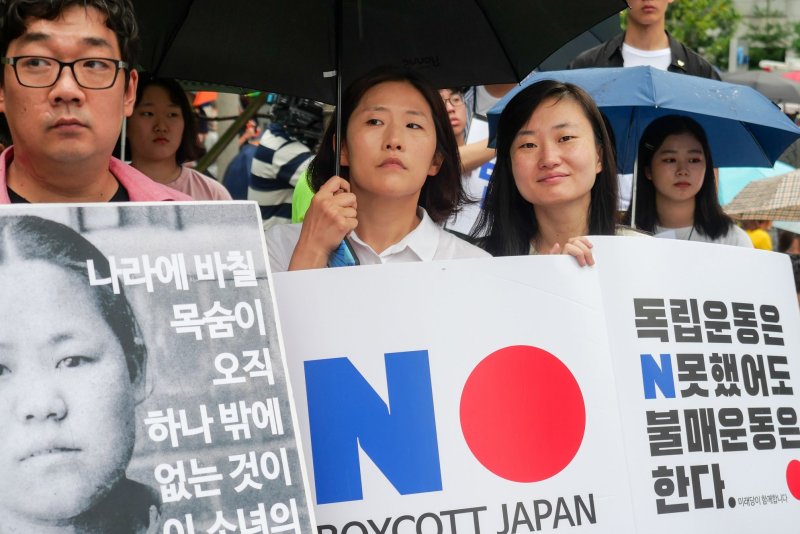South Korean response to Japan's trade restrictions have included protests as the government reviews a military sharing agreement with Tokyo. Photo by Thomas Maresca/UPI |
License Photo
Aug. 2 (UPI) -- South Korea could be considering placing a military intelligence-sharing agreement with Japan under review, following Tokyo's decision to remove South Korea from a "white list" of preferred trading partners -- a move that drew criticism from ASEAN member countries on Friday.
Blue House national security office second deputy chief Kim Hyun-chong said Friday at a press briefing Japan's latest moves raise questions about Tokyo's trustworthiness, local news service Seoul Pyongyang News reported.
"The government will take comprehensive response measures, including [reviewing] whether it is appropriate to continue to share sensitive military information with countries that have raised issues with [South Korea], regarding trust and security," Kim said, according to the report.
The South Korean official also said the movement in the country to resist Japan's trade restrictions has "staying power because of the support of the Korean people."
"This is a difficult period, but we will overcome," Kim said.
Earlier Friday, President Moon Jae-in said, "South Korea would never be defeated by Japan again," a reference to Japan's past occupation of the Korean Peninsula.
Kim also said the current tensions with Japan could provide an opportunity for South Korea to leave behind the present-day system of trade, where South Korea manufactures the finished product while Japan provides core materials, including chemicals.
"We must leave behind this system [of dependence]," Kim said. "If Japan targeted [South Korea] with these measures 20 years ago, the situation would have been more serious."
The agreement known as Japan-Korea GSOMIA was the first bilateral military consensus reached between the two countries since the end of World War II. The deal was signed in 2016 under then-President Park Geun-hye. It has enabled Seoul and Tokyo to share military intelligence regarding North Korea.
Japan may have benefited from the intelligence sharing, given the South's greater proximity to the Kim Jong Un regime. Benefits for South Korea may have been substantially less, according to South Korean analyst Moon Geun-sik of Seoul's Korea Defense Security Forum, South Korean news service Financial News reported Friday.
Japan's trade retaliation comes after Seoul's decision to support Japanese firm compensation for Korean victims of forced wartime labor.
On Friday at a regional security forum in Thailand, Singaporean Foreign Minister Vivian Balakrishnan indirectly criticized the Japanese decision and urged countries to "increase the white list" rather than reduce it, Yonhap reported.















